Science fiction is often characterized as being at least partially in dialogue with itself, as some authors explicitly respond to others’ ideas in fictional form, creating an ongoing “story conversation” in which notions are fictionally investigated and re-investigated from contrasting angles and differing sensibilities. Of course, there’s also another, more literal tradition of thought-provoking conversation within the field: probing interviews and books of transcribed conversations.
Today I’d like to highlight seven such volumes—in addition to illuminating the fascinating personalities and lives of their subjects, these books offer invaluable perspectives on the genre’s history and on the creative processes of some of its finest practitioners.
Being Gardner Dozois (2001) by Michael Swanwick
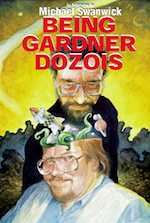 A brilliant writer and five-time Hugo winner, Michael Swanwick interviews one of the field’s most-beloved figures, Gardner Dozois, widely known as an editor (he’s won fifteen Hugos as “Best Professional Editor”) but also a fantastic writer in his own right—how could this dialogue be anything but captivating?
A brilliant writer and five-time Hugo winner, Michael Swanwick interviews one of the field’s most-beloved figures, Gardner Dozois, widely known as an editor (he’s won fifteen Hugos as “Best Professional Editor”) but also a fantastic writer in his own right—how could this dialogue be anything but captivating?
Swanwick’s focus is on Dozois’ fiction, and he methodically works his way through Dozois’ stories in chronological order, beginning with the first, “The Empty Man” (1966), to “A Knight of Ghosts and Shadows” (1999), the most recent at the time the interview was conducted. Thankfully, Dozois has penned a handful of new stories since then; the latest is “The Place of Bones” (2016), and I can only hope there’ll be more. Dozois’ collection When the Great Days Come (2011), by the way, is consistently excellent and would serve as a solid primer.
Here’s a telling quote from the discussion of Dozois’ “Playing the Game” (1981):
But the basic Dozois story, stripped to its fundamentals, will be one person in deteriorating mental or emotional condition staggering around observing a lot of stuff that’s happening that he really doesn’t have much to do with.
I’m aware that that’s sort of the fundamental cliché Dozois story, so I try to work changes on that or avoid doing that. But that seems to be what I fall into naturally.
And now, a confession: I’ll admit that when I was casting about for examples that I could use in my pitch to publishers for a potential book of interviews with Robert Silverberg, Swanwick’s book was the first that came to mind. Though Swanwick’s chronological approach may be impractical for writers with large bibliographies, the rapport and depth of this conversation makes it an excellent model to aspire to for interviewers. Swanwick is extremely knowledgeable and quick on his feet. In short, this is an indispensable reference on Dozois’ fiction, and a lot of fun, too.
Closing the circle on this one, I’m very grateful that Dozois agreed to write the Introduction to Traveler of Worlds: Conversations with Robert Silverberg (2016).
Dream Makers: The Uncommon People Who Write Science Fiction (1980) by Charles Platt
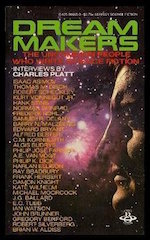 This collection of thirty interviews, conducted in person by Platt, was well received at the time of publication, which led to a sequel volume three years later. Authors range from the very famous, such as Isaac Asimov and Frank Herbert, to lesser-known figures like Hank Stine and E. C. Tubb. Platt makes each chapter a portrait of its author, rather than a mere interview, by including a photograph, setting the scene in detail, offering additional contextual information about body language, attitude and so on, and appending bibliographical notes after the main text. Only one woman, Kate Wilhelm, is included, and her profile is a joint one with Damon Knight, so the book offers an extremely skewed gender perspective. The balance was marginally better in Dream Makers, Volume II: The Uncommon Men & Women Who Write Science Fiction (1983), which includes pieces on six female writers.
This collection of thirty interviews, conducted in person by Platt, was well received at the time of publication, which led to a sequel volume three years later. Authors range from the very famous, such as Isaac Asimov and Frank Herbert, to lesser-known figures like Hank Stine and E. C. Tubb. Platt makes each chapter a portrait of its author, rather than a mere interview, by including a photograph, setting the scene in detail, offering additional contextual information about body language, attitude and so on, and appending bibliographical notes after the main text. Only one woman, Kate Wilhelm, is included, and her profile is a joint one with Damon Knight, so the book offers an extremely skewed gender perspective. The balance was marginally better in Dream Makers, Volume II: The Uncommon Men & Women Who Write Science Fiction (1983), which includes pieces on six female writers.
The author profiles themselves unfailingly capture interesting moments and nuances of expression, and it’s lovely to get so many voices in one source. Platt goes for naturalism, unafraid to explore his own ideas when he feels it’s called for, but he generally keeps his focus on the authors’ works, with minimal gossiping. Despite its flaws, I consider this a key book of science fiction dialogues.
To sample its flavor, it may be appropriate to invoke the chapter on Edward Bryant, who, alas, died on February 10th. Towards the end of his conversation with Platt, Bryant says:
There’s a wonderful couplet: “When I’ve died I hope it may be said/My sins were scarlet but my books were read.” That’s a great one to use at writers’ workshops. It amuses the crowd, it’s a wonderful ice-breaker. And then you can get on to talking about narrative hooks.
May Bryant’s books indeed long be read.
And again to veer into the autobiographical: Platt’s was one of many Silverberg interviews I read when I was preparing my questions for Bob a few years ago, and I ended up referencing Platt’s book explicitly in one of our conversations.
Pioneers of Wonder: Conversations with the Founders of Science Fiction (1999) by Eric Leif Davin
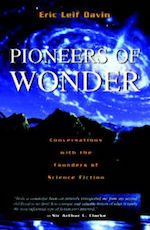 Here the scope is historical, focusing on the 1920s and 1930s. In that sense, this a nice complement to Platt, because there’s no overlap of authors. It also makes this book more of a niche item, of particular interest to researchers into science fiction’s formative years. This survey includes conversations with David Lasser, Charles D. Horning, Margaret Weinbaum Key, Raymon Z. Gallun, Frank K. Kelly, Thomas E. Starzl, Lloyd Arthur Eshbach, and Curt Siodmak, as well as other pieces. If these names are unfamiliar to you, you’re in for a treat.
Here the scope is historical, focusing on the 1920s and 1930s. In that sense, this a nice complement to Platt, because there’s no overlap of authors. It also makes this book more of a niche item, of particular interest to researchers into science fiction’s formative years. This survey includes conversations with David Lasser, Charles D. Horning, Margaret Weinbaum Key, Raymon Z. Gallun, Frank K. Kelly, Thomas E. Starzl, Lloyd Arthur Eshbach, and Curt Siodmak, as well as other pieces. If these names are unfamiliar to you, you’re in for a treat.
One of many interesting moments occurs in a conversation with Charles D. Hornig, when he’s asked about Clark Ashton Smith:
Anyway, Smith lived near Auburn, California. That’s about thirty miles east of Sacramento. He met me at the hotel bus station and drove me to his isolated cabin. He lived way out of town on top of a mountain in a tiny cabin all by himself. He had decorated the place in the fashion of his writings. For instance, he had a rock garden in which every single rock was a gargoyle, which he had sculpted. He was also a good painter, and his weird paintings were hanging all over the walls. It was all very bizarre.
Conversations with Ursula K. Le Guin (2008) edited by Carl Freedman
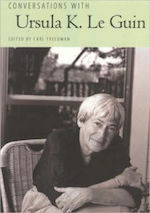 This, along with my next two picks, is part of the wide-ranging “Literary Conversations” series published by the University Press of Mississippi. Unlike Swanwick’s book, which offers an extended, in-depth conversation between Swanwick and Dozois, or Platt’s volume, which compiles a plethora of shorter author profiles all created by Platt, these books recollect interviews conducted by different interviewers across the years, sometimes decades. The individual book editor, in this case Carl Freedman, supplements this interview-centric core with an Introduction, and we also get a Chronology and a helpful Index. In this volume the closing conversation is conducted by Freedman himself.
This, along with my next two picks, is part of the wide-ranging “Literary Conversations” series published by the University Press of Mississippi. Unlike Swanwick’s book, which offers an extended, in-depth conversation between Swanwick and Dozois, or Platt’s volume, which compiles a plethora of shorter author profiles all created by Platt, these books recollect interviews conducted by different interviewers across the years, sometimes decades. The individual book editor, in this case Carl Freedman, supplements this interview-centric core with an Introduction, and we also get a Chronology and a helpful Index. In this volume the closing conversation is conducted by Freedman himself.
Throughout these interviews, Le Guin shines just as brightly as one would expect, with all manner of insightful, astute observations about politics, art, anthropology, other writers and so on. For readers interested in Le Guin, this and the recently-published Words Are My Matter: Writings About Life and Books, 2000-2016 (2016) make for an excellent double bill.
This is from a 1991 interview with Rebecca Rass—long before Le Guin became part of the Library of America series:
“‘Does it bother you,’ I asked her, ‘that you are categorized as a science-fiction writer and thus excluded from what is generally considered “literature”?’
‘This is a very complicated issue,’ she said. ‘I object very strongly to the genrefication of literature. There is an assumption that everything called genre is secondary. This is simply untrue. Are writers such as Marquez, Borges, or Calvino automatically second-rate because they aren’t writing realistic literature or mainstream fiction?
‘On the other hand, there is marketing. In order to get the books to the interested public, libraries and bookstores and publishers need categories. And there is another aspect. As a writer of a despised genre, you have a kind of freedom. You are not nagged by the academics and critics, you can do whatever you please. In some ways I do feel trapped when I’m called a science fiction writer, and in other ways I feel delighted. On the whole, I think that boundary lines are changing, although conservative people don’t want to admit it.’”
Conversations with Octavia Butler (2009) edited by Conseula Francis
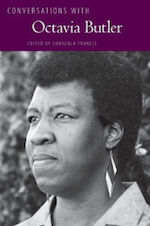 Same concept as before. Unlike Le Guin and Delany, I’m not aware of any nonfiction books by Butler, so this volume becomes of primary importance in investigating her opinions and ideas. In terms of secondary sources, the University of Illinois Press “Modern Masters of Science Fiction” series has recently published Octavia E. Butler (2016) by Gerry Canavan, which I look forward to reading. This study, which makes use of unpublished manuscripts and drafts, promises to be of critical importance for a comprehensive understanding of Butler’s work.
Same concept as before. Unlike Le Guin and Delany, I’m not aware of any nonfiction books by Butler, so this volume becomes of primary importance in investigating her opinions and ideas. In terms of secondary sources, the University of Illinois Press “Modern Masters of Science Fiction” series has recently published Octavia E. Butler (2016) by Gerry Canavan, which I look forward to reading. This study, which makes use of unpublished manuscripts and drafts, promises to be of critical importance for a comprehensive understanding of Butler’s work.
In terms of the conversations compiled in Consuela Francis’ book, here are two quotes. This first one is from a 1991 chat with Randall Kenan:
All sorts of things influence me. I let things influence me. If they catch my interests I let them take hold. When I was growing up I read mostly science fiction. I remember getting into Harlan Ellison’s class and at one point having him say, science fiction fans read too much science fiction; and he was no doubt right, but as an adolescent that was all I read except for school work. I guess the people that I learned the most from were not necessarily the best writers (although Theodore Sturgeon was one of them and I think he was definitely one of the best writers). They were people who impressed me with their ideas. I didn’t know what good writing was frankly, and I didn’t have any particular talent for writing so I copied a lot of the old pulp writers in the way I told a story. Gradually I learned that that wasn’t the way I wanted to write.
The following quote is from a 1997 interview with Joan Fry:
I would say that speculative fiction is any kind of non-conventional fiction, from Borges to Isaac Asimov. But I don’t make any distinction. Labels are something that people just absolutely require, and there’s nothing I can do about it. As I’ve said before, I write about people who do extraordinary things. It just turned out that it was called science fiction.
Conversations with Samuel R. Delany (2009) edited by Carl Freedman
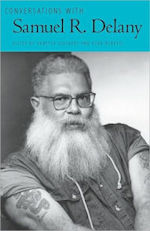 Delany’s body of non-fiction is almost as impressive as his fiction, but it can be an intimidating catalog. Where to begin? About Writing (2006), despite the perhaps deceptively simple title and its many wonderful insights, can be tough ongoing. In my case I found Delany’s autobiographical texts, like The Motion of Light in Water (1988), to provide a warmer intro. In a Locus roundtable I conducted in 2014, Fábio Fernandes described Conversations with Samuel R. Delany as “the most delightful reading I had in a while,” and it’s hard to disagree.
Delany’s body of non-fiction is almost as impressive as his fiction, but it can be an intimidating catalog. Where to begin? About Writing (2006), despite the perhaps deceptively simple title and its many wonderful insights, can be tough ongoing. In my case I found Delany’s autobiographical texts, like The Motion of Light in Water (1988), to provide a warmer intro. In a Locus roundtable I conducted in 2014, Fábio Fernandes described Conversations with Samuel R. Delany as “the most delightful reading I had in a while,” and it’s hard to disagree.
Here’s one snippet on the New Wave, a subject near and dear to my heart, from a 2001 interview with Jayme Lynn Blaschke:
The New Wave had some extraordinary writers: Disch, Zolines, Ballard. And, yes, they wrote what they wrote back then. Well, Camp Concentration, 334, On Wings of Song, Neighboring Lives (this last, Disch’s collaboration with Charles Naylor),… these were—and remain—extraordinary. I’m hoping soon people will begin to rediscover the range of Joanna Russ’s work–and the work of the late Roger Zelazny, through Bridge of Ashes and Doorways in the Sand, before he became trapped in the downward commercial spiral of his Amber series.
Borges at Eighty: Conversations (1982) by Willis Barnstone
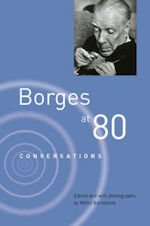 This work is full not only of mesmerizing interviews, but also transcribed readings that include fragments of poetry and overt autobiographical writing. I can’t think of anyone interested in Borges’ thought that wouldn’t come away from this feeling substantially closer to understanding this sly, extremely complicated man. Some readers may wonder why I’m selecting this Borges interview book and not, more consistently with my previous three picks, the one edited by Richard Burgin as part of the University Press of Mississippi’s “Literary Conversations” series. Two reasons: These conversations are with Willis Barnstone, and thus the effect is more unified than in the other, more panoramic volumes. Also, as the title indicates, we get Borges at eighty—he lived to be eighty-six—and that unifies the book temporally as well, and provides a solemn, retrospective quality to some of the discussions. Here’s an excerpt from the second chapter, “When I Wake Up,” that many may find morbid:
This work is full not only of mesmerizing interviews, but also transcribed readings that include fragments of poetry and overt autobiographical writing. I can’t think of anyone interested in Borges’ thought that wouldn’t come away from this feeling substantially closer to understanding this sly, extremely complicated man. Some readers may wonder why I’m selecting this Borges interview book and not, more consistently with my previous three picks, the one edited by Richard Burgin as part of the University Press of Mississippi’s “Literary Conversations” series. Two reasons: These conversations are with Willis Barnstone, and thus the effect is more unified than in the other, more panoramic volumes. Also, as the title indicates, we get Borges at eighty—he lived to be eighty-six—and that unifies the book temporally as well, and provides a solemn, retrospective quality to some of the discussions. Here’s an excerpt from the second chapter, “When I Wake Up,” that many may find morbid:
I mean that when I’m unhappy—and that happens quite often to all of us—I find a real consolation in the thought that in a few years, or maybe in a few days, I’ll be dead and then all this won’t matter. I look forward to being blotted out. But if I thought that my death was a mere illusion, that after death I would go on, then I would feel very, very unhappy. For really, I’m sick and tired of myself… When I think of mortality, of death, I think of those things in a hopeful way, in an expectant way. I should say I am greedy for death, that I want to stop waking up every morning, finding: Well, here I am, I have to go back to Borges.
Bonus Pick: Gene Roddenberry: The Last Conversation (1994) by Yvonne Fern; aka Inside the Mind of Gene Rodenberry (1995)
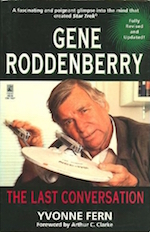 This may be the first extended interview book I ever read. Besides holding that dubious honor, it provides insight into Gene Rodenberry’s final days. I recall, at the time I first read this twenty-two years ago, that I thought it by turns engrossing, dull, passionate, solipsistic, rambling, philosophical, profound, trite, and often melancholy. It also contains a fair amount about Yvonne Fern herself. If you do pick it up, I would recommend learning more about Rodenberry’s life through other venues to complement whatever impression this book makes.
This may be the first extended interview book I ever read. Besides holding that dubious honor, it provides insight into Gene Rodenberry’s final days. I recall, at the time I first read this twenty-two years ago, that I thought it by turns engrossing, dull, passionate, solipsistic, rambling, philosophical, profound, trite, and often melancholy. It also contains a fair amount about Yvonne Fern herself. If you do pick it up, I would recommend learning more about Rodenberry’s life through other venues to complement whatever impression this book makes.
I’ll leave you with this quote, which occurs roughly midway through the book: “Nothing is really real to me unless it also exists in my dreamworld.”
 Alvaro Zinos-Amaro‘s love of dialogue led to Traveler of Worlds: Conversations With Robert Silverberg (2016).
Alvaro Zinos-Amaro‘s love of dialogue led to Traveler of Worlds: Conversations With Robert Silverberg (2016).










